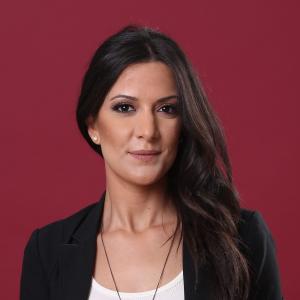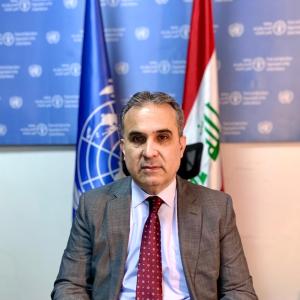Building Sustainable Livelihoods for Returning Farmers: EU and FAO highlight the lasting impact of the Nineveh project
07 September 2025
Nineveh, Iraq – 2 September 2025 – A high-level delegation from the European Union (EU), led by Ms. Henrike Trautmann, Director for the Middle East, Northern Africa and the Gulf, and Mr. Lennart Deridder, Chargé d’Affaires and Head of Cooperation in Iraq, visited Shaqoli and Al-Hamdania in Nineveh Governorate to witness the impact of a completed EU-funded project implemented by the Food and Agriculture Organization of the United Nations (FAO) in collaboration with Iraq’s Ministry of Agriculture and local authorities.

The delegation was welcomed by HE Dr. Mithaq Al Khafaji, Technical Deputy of the Minister of Agriculture; Dr. Rabii Youssif, representing the Nineveh Governorate Council; government officials; as well as Dr. Salah El Hajj Hassan, FAO Representative in Iraq, together with the FAO Iraq team.
Over four years (2019–2023), the project “Supporting the Livelihoods of Returning Farmers in Rural and Peri-Urban Areas of Nineveh Governorate” worked to reintegrate returnee families, strengthen rural livelihoods, and contribute to agricultural recovery in one of the most war-affected regions of Iraq.
The visit included rural milk collection, processing and marketing centers, where returnee families successfully rebuilt their lives, secured stable incomes, and contributed to strengthening and developing the livestock value chain through improved fodder cultivation and dairy production.
“This project is a tangible example of the EU’s commitment under the Global Gateway to foster sustainable growth, jobs and investment in Iraq” said Ms. Henrike Trautmann. “By supporting dairy cooperatives, olive and wheat farmers, it helped rebuild resilient communities where displaced families could return and thrive. Building on this success, the EU looks forward to exploring further opportunities for cooperation to sustain and expand these achievements in the future,” she added.
They also met with olive and wheat farmers supported by the project, who shared both the challenges that persist and wish for future cooperation to build on the project’s achievements.
Although the project ended in 2023, its success has since drawn strong interest from the Government of Iraq and other donors, leading to its replication in southern and Middle Euphrates regions, amplifying its impact nationwide.
For his part, Dr. Mithaq Al Khafaji, Deputy Minister of Agriculture for Technical Affairs, added: “The project demonstrated that when international support is combined with full partnership with national counterparts, it can enable diverse communities to rebuild their lives. By empowering farmers and returnees, we have set a model that we are committed to sustain and expand across Iraq.”
Dr. Rabii Youssif, member of the Nineveh Governorate Council, expressed his gratitude to the European Union and the outstanding efforts of FAO, stressing that the project highlighted the importance of close cooperation between local institutions and international organizations—particularly FAO—in achieving sustainable results for the people of Nineveh.
Dr. Salah El Hajj Hassan, FAO Representative in Iraq, concluded: “I would like to thank the European Union for its generous support and to value the close cooperation with the Ministry of Agriculture throughout this project,” FAO reaffirms its commitment to build on these achievements and to continue supporting Iraq in strengthening resilient livelihoods and a more sustainable agricultural sector.”
This initiative has contributed to Iraq’s progress toward the Sustainable Development Goals (SDGs)—particularly SDG 1 (No Poverty), SDG 2 (Zero Hunger), SDG 8 (Decent Work and Economic Growth), SDG 10 (Reduced Inequalities), and SDG 17 (Partnerships for the Goals).


He started his career in 1984, as Senior Research Assistant in the Agricultural Research and Education Centre (AREC), American University of Beirut. From 1987 to 1991, he was Coordinator of the Student Training Programme, and also Agriculture and Horticultural Teacher for the Faculty of Agriculture, at the Lebanese University.
From 1991 to 1995, he worked as Agricultural Engineer at the Ministry of Agriculture, Bekaa Regional Office, Zahlah and was then assigned to the Agricultural Research Institute in the Tal Amara station, first as Head of the Crop Production Department and subsequently in charge of the Plant Protection Laboratory. From 2002 to 2006, he was Director of the Kfardane Research Station (Agricultural Research Institute). In 2008, he became Visiting Scientist at the International Maize and Wheat Improvement Centre (CIMMYT) and Coordinator of a project with the International Centre for Atomic Energy Agency, Vienna.
In 2010, he served as Advisor to the Minister for Agriculture of Lebanon. In 2011, he became President of the Pesticide Scientific Committee, Head of the Phytoplasma Committee and Director of the Agriculture and Rural Development Programme (ARDP) (EU-funded project). From 2010 to 2013, he represented Lebanon in negotiations with EU, Egypt, Jordan and Iraq. During his career, Mr Hajj Hassan also carried out a number of other functions. He represented the Lebanese Agricultural Research Institute (LARI) in several research programmes with the International Centre for Agricultural Research in the Dry Areas (ICARDA) and the American University of Beirut. He was Coordinator of the Mashreq/Maghreb project with ICARDA, representing Lebanon in the Steering Committee, as well as being the Head of the Sugar-beet Delivery and of the Wheat Delivery Committees. For a number of years, Mr Hajj Hassan worked for the preparation of FAO TCP projects and served as the National Director of a TCP project. He joined FAO in January 2014 as FAO Representative in Yemen. Mr Hajj Hassan succeeds Mr El Zubi as FAO Representative in Iraq.

